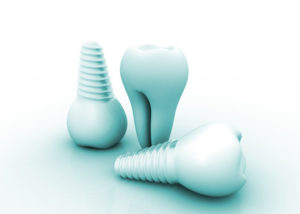Is the dental implant prone to cavities or gum disease?


Bone in the jaw will graft to the implant over a period of time while healing occurs. The implant and jaw bone will become the supportive structure for the restoration that will eventually cover the implant.
The implant itself is made from metal; the restoration is usually comprised of metal or porcelain …these materials are not biological in nature so they will not develop decay. However, the gum tissue surrounding the implanted area can certainly suffer from the effects of gum disease.
If tooth loss occurred due to periodontal issues, your dentist may see the need for building up bone in the gums where the implant is to be placed. This can be done with either cadaver bone or with synthetic bone material. If there is insufficient bone, the implant will not be able to support the restoration.
The implant and bone will merge (a process referred to as osseointegration) to form a base that functions much like the roots of your natural tooth to provide stability and strength for the restoration above the gum line.
There are steps the patient can take to promote healthy teeth and gums. Primarily brush twice daily with a fluoridated tooth paste; floss daily to remove what your tooth brush misses; and visit your dentist every six months for cleaning, polishing, and a dental exam.
In addition to these actions, watching what you eat and drink by limiting sugary snacks and beverages will help; do not use tobacco in any form (smoking is a leading cause for implant failure as well as a large contributor to the development of gum disease); drink water to stay hydrated; get sufficient rest and exercise; and if you decide to invest in dental implants, follow your dentist’s directions for a successful result.
Patients that have lost one or more teeth from trauma, decay, or disease can once again eat all the foods they love, speak clearly, and smile with self-confidence thanks to the availability of dental implants. While decay is not a concern for implant patients, gum disease must be carefully monitored to keep your implant healthy and functioning for your lifetime.
To learn more about your tooth replacement options, contact our team at Howl Dental. Call 918-749-1626 today to schedule your visit.